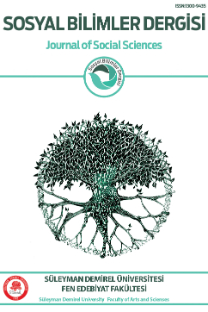The Precarious Presence Of The Victim-Oppressor Antinomy And The Opposing Narratives Of The Past In The Albanian-Serbian Communication In The Modern Kosovo (Some Reflections Inspired By Helena Zdravković's Research)
One of the most prominent issues related to functioning of modern Kosovo are problems, rooted in history, with Serb and Albanian relations. The lack of such attitudes as understanding, respect and trust is apparent. The problem of malfunctioning communication between the Serb and Albanian inhabitants of Kosovo has a distant and compound origin. While exploring it, one should notice that the vast majority of generations of Kosovo Albanians and Kosovo Serbs have for decades used the conflicting historical narrative (exploiting a range of aspects from quarrels over ethnogenesis, ancient and medieval history, to modern history events) instrumentally. They have formulated their image of “the Other” on the basis of specific inventory of stereotypes and myths, with highly unfavourable image of the ethnically different neighbour. The approach to the self and one's own community is extremely divergent. The latter is viewed as heroic, proud, better, having more advanced culture. Own cultural, economical, territorial or political aspirations always appear to be morally justified – aspirations of others do not deserve approval as they are unjustified. In modern times, the feeling of entanglement in unyielding, perpetual conflict of interests of the two nations can be seen in Serbs and Albanians from Kosovo. There appear to be efforts on both sides in acquiring the victim identity and using this self-determination in social discourse in a deliberate and calculated way which has been depicted blatantly by Helena Zdravković – an American specialist in the field of social discourse who comes from Serbia. Following her research, the author of this text signals the issues exemplified above. The text presents opinions on whether (and on what condition) it is likely for the antagonized communities to cease fights about the history and reject the blinding stereotypes of the simplified notional opposition of victim – victimizer, in order to turn to the dimension of pragmatism and dialogue which can result in cooperation on the plane of creating Kosovo statehood, free from social and political distortions.
Anahtar Kelimeler:
xx
The Precarious Presence Of The Victim-Oppressor Antinomy And The Opposing Narratives Of The Past In The Albanian-Serbian Communication In The Modern Kosovo (Some Reflections Inspired By Helena Zdravković's Research)
One of the most prominent issues related to functioning of modern Kosovo are problems, rooted in history, with Serb and Albanian relations. The lack of such attitudes as understanding, respect and trust is apparent. The problem of malfunctioning communication between the Serb and Albanian inhabitants of Kosovo has a distant and compound origin. While exploring it, one should notice that the vast majority of generations of Kosovo Albanians and Kosovo Serbs have for decades used the conflicting historical narrative (exploiting a range of aspects from quarrels over ethnogenesis, ancient and medieval history, to modern history events) instrumentally. They have formulated their image of “the Other” on the basis of specific inventory of stereotypes and myths, with highly unfavourable image of the ethnically different neighbour. The approach to the self and one's own community is extremely divergent. The latter is viewed as heroic, proud, better, having more advanced culture. Own cultural, economical, territorial or political aspirations always appear to be morally justified – aspirations of others do not deserve approval as they are unjustified. In modern times, the feeling of entanglement in unyielding, perpetual conflict of interests of the two nations can be seen in Serbs and Albanians from Kosovo. There appear to be efforts on both sides in acquiring the victim identity and using this self-determination in social discourse in a deliberate and calculated way which has been depicted blatantly by Helena Zdravković – an American specialist in the field of social discourse who comes from Serbia. Following her research, the author of this text signals the issues exemplified above. The text presents opinions on whether (and on what condition) it is likely for the antagonized communities to cease fights about the history and reject the blinding stereotypes of the simplified notional opposition of victim – victimizer, in order to turn to the dimension of pragmatism and dialogue which can result in cooperation on the plane of creating Kosovo statehood, free from social and political distortions.
___
- Enti i Statistikës së Kosovës: http://www.ks-gov.net/ESK/esk/index.htm (2012.05.28).
- Mančev, Krastjo, Rola stereotypów narodowych w historii narodów bałkańskich, Dzieje Najnowsze, No. 2, 1998, p. 20.
- Sokołowska, Patrycja, Niepodległość Kosowa jako czynnik stabilizujący relacje serbsko- albańskie w Kosowie, Przegląd Zachodni, Vol. 337, No. 4, p. 155-177.
- Szczepański, Wojciech, Mity i stereotypy. Stosunek elit serbskich do Albańczyków z wilajetu kosowskiego (1878-1912), Przegląd Zachodni, Vol. 324, No. 3, p. 143-156.
- Zdravković, Helena, Politika žrtve na Kosovu. Identitet žrtve kao primarni diskurzivni cilj Srba i Albanaca u upornom sukobu na Kosovu (Beograd: Srpski genealoški centar, 2005, pp. 284).
- ISSN: 1300-9435
- Yayın Aralığı: Yılda 3 Sayı
- Başlangıç: 1995
- Yayıncı: Süleyman Demirel Üniversitesi, Fen-Edebiyat Fakültesi
Sayıdaki Diğer Makaleler
Edward Grey And The First Balkan War
Implications of Dayton Peace Agreement on current political issues in Bosnia-Herzegovina
The European Union Policy towards the Balkan States in the Post-Cold War Era
Illegal Migrations Along the Balkan Routes
GCC Model: Conflict Management for the "Greater Albania"
